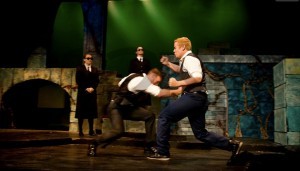Should I Hire a Fight Director?
Hiring a Fight Director
Here are some suggestions on how to best utilize a fight director, and get the right one for your show:
- Always check the credentials of the fight director. Have they been trained? What experience do they have?
-
Know the script and your concept so that you and the fight director can speak about appropriate weapon and style choices.
-
Hire early. Never wait until the last minute to hire a fight director. In order to keep stage combat safe, actors need to be able to practice. And depending on the experience and movement capabilities of your actors and the difficulty, length, and number of fights in your show, practice time will vary. Minutes of combat onstage means hours of rehearsal.
-
Have someone not involved in the fight, your stage manager or another actor act as Fight Captain. This individual should attend all fight rehearsals and work closely with the fight director. If you don’t have anyone that is willing, ask the fight director if they could help you hire someone. This individual will be responsible for keeping the integrity of the fights up when the fight director cannot be present as well as running daily fight calls.
Reasons you should hire a Fight Director:
Sometimes a lack of understanding or an overestimation of capabilities causes a director to think they can stage their own combat without consulting a trained fight director. This can be particularly frightening if the director has never done any stage combat themselves. It is a true miracle if no injury occurs.
Along with the true threat of injury to both actor and audience is the effect of badly staged combat. Many times right in a truly climatic, dramatic point in a play there is some type of violence. When the violence looks fake or dangerous to the actors instead of the characters, the result can be laughter or a withdrawal of the audience from the world of the play.
Budget shortage seems to be a problem for most theatres. Some directors realize that they need the help of a fight director, but don’t seem to have the money to hire one. When possible, budgeting should be included for a specialist when deciding to do a production with violence. Would a director ever think about staging A Chorus Line without a dance choreographer? Or do Oklahoma without a music director? The key question is: When did safety become too expensive?
There are also those directors that don’t fully understand the psychological importance of violence to the characters and plot. These directors seem to gloss over the action with a simplified solution or bad stage combat or they cut it out altogether. If it wasn’t important to the play, playwrights would leave the violence out.




